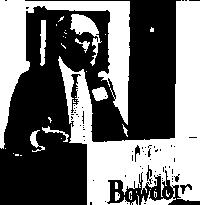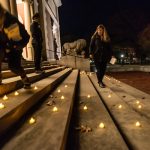Trustee Joseph V. McDevitt ’75 delivered remarks at at the Scholarship Appreciation Luncheon held May 12, 2016, in Thorne Hall.
Thank you for that introduction, Clayton, and for the opportunity to speak at this wonderful event. Good afternoon, everyone! There are three messages I hope you’ll take away from my remarks today: First, Bowdoin is a truly special place. Second, good access to Bowdoin starts with awareness, improves with encouragement, and finishes with funding. And third, there are lots of valuable ways we can all give back to Bowdoin.

Joe McDevitt ’75
Why have I chosen these three messages? Let me try to explain by describing some scenes from my personal history with Bowdoin, not just during my student years, but before and after—yes, after! Especially to you students I hope to show how, though at some point we all leave Bowdoin, Bowdoin never leaves us.
I’m the oldest of eight children and was fortunate to be raised in a home that was loving and supportive, even if sometimes hectic and slightly chaotic. My dad was a salesman who worked hard for a salary that paid the mortgage and clothed and fed us all, but didn’t stretch much further than that. Yet, this was the American middle class dream of the 1960s—a good life on an average income and a deep belief in unlimited opportunities for your children.
I was not aware of Bowdoin until the spring of my sophomore year in high school when Billy Sexton, a top student a few years ahead of me, told me that he was going to Bowdoin. I had always looked up to Billy as a role model so I put Bowdoin on my list of colleges to research. Towards the end of my junior year Billy got in touch and encouraged me to visit him at Bowdoin. I did visit and fell in love with the place. I put my heart and soul into the early admissions application and somehow managed to get accepted—thank God it was 1970 and not 2016, not only for the sake of my admissions chances but also for the sake of funding my Bowdoin education. I recall tuition, room and board costing $3,200 for my first year. From the summer before starting at Bowdoin and over the next three summers I worked as a milkman, earning $195 a week, which meant in 1971 I could earn enough working in a blue-collar summer job to fund almost half my college expenses for the year. Bowdoin funded much of the rest through financial aid, for which I was, and remain, forever grateful. It’s obvious how much more challenging it must be today for most students and their families to fund a college education. More than ever, Bowdoin’s strong financial aid program is a mission-critical necessity if the College is to continue to serve the common good and attract talented students from diverse backgrounds.
My four years at Bowdoin were indeed some of the best years of my life. It was a great place to grow up–the mix of new friendships with people from different places and backgrounds, and the exposure to new ideas and new ways of thinking and seeing gave me invaluable tools for life. Though my early pre-med aspirations foundered and sank on the shoals of physical chemistry, I fortunately found safe harbor and a stimulating major in the psychology department under the leadership of Professor Al Fuchs. I took the offer of the college to heart, especially when it came to losing myself in generous enthusiasms. I played football and ran track, was student coordinator of the Big Brother/Big Sister program, was a class and fraternity president, and even DJ’d an early Sunday morning radio program for WBOR, though I eventually realized I only got that slot because no one was ever going to be awake to listen to it. In fact, when I managed to broadcast ten minutes of dead air by accident early one Sunday morning not a single person called to complain!
Amid all these “generous enthusiasms” I assure you I also found time to go to classes and study, though my close friends will recall me pulling lots of all-nighters and dashing across campus to deliver term papers to faculty offices as the chapel bells rang out to signal yet another deadline. I admit I did not learn effective time management at Bowdoin—but I did learn the value of effective time management by the time I graduated!
When the Peace Corps sent a recruiter to campus early in my senior year, I saw an exciting opportunity to “be at home in all lands and all ages”. So, following graduation in 1975 I got my first passport and was off with the Peace Corps to work as a public health worker in the South Korean countryside. This was a truly transformative experience for me—I thrived as I adjusted to a new culture and learned a new language. I figured, if I could learn to read passages of the New Testament in Greek in Nate Dane’s introductory classics course, what was to keep me from learning to read a newspaper in Korean? When my three years with the Peace Corps ended Won Young and I had just married, we wanted to remain in Korea, and I needed a job. By luck, I was introduced to a fellow named Mac Deford, who had just arrived in Seoul to open an office for Merrill Lynch. Mac and I hit it off, I’m sure only because Mac had just left a twenty-year career in the Foreign Service and was impressed that I spoke Korean. I’m not sure anyone else from Merrill would have given me a second look but Mac said “yes,” subject to one condition—I needed to pass a short economics test. Bowdoin to the rescue again! I had taken a single, but suddenly very valuable, economics course at Bowdoin with David Vail. With the “keys of the world’s library in my pocket,” off I dashed to find some books to help me brush up. Thankfully, enough of supply/demand curves came back to me– I passed the test and got the job.
Three interesting years later Won Young and I decided it was time to move back to the States, and I decided I enjoyed the cut and thrust of international business enough to build my knowledge base and credentials with an MBA. But there was one big problem—the MBA applications all required a detailed recommendation from a college faculty member, “who knows you well”. Six years after leaving Bowdoin I feared I would be long forgotten. Nevertheless, I sat down and wrote a “please help” letter to Professor Fuchs, who by now was no doubt busier than ever as Dean of the Faculty. To my delight, I quickly received back a personal, warm letter. Six long years later, Professor Fuchs did in fact remember me, and kindly offered to provide the necessary letters of recommendation. If I didn’t know before, I knew then—Bowdoin is a truly special place!
Though we’re here this afternoon to appreciate and thank those who have been willing and able to help fund Bowdoin’s critical financial aid program, I also hope you students know that there are many valuable ways you can give back to Bowdoin while you’re still here as well as after your graduation. As Billy Sexton did, raise awareness about Bowdoin back at your high schools and in your communities, and encourage talented students you know to apply. Stay engaged with Bowdoin after you leave. Each year, many alumni return to Bowdoin as artists, writers, business leaders, academics and community leaders, to reconnect and share their experiences. Volunteer with BASIC, our alumni schools interviewing committees which are spread all around the country and the world to support the vital work of our admissions team. Try to make as many reunions as you can, and yes, get in the habit of giving what you can to the annual alumni fund campaign. We’re Bowdoin students for only four short years, but we’re Bowdoin alumni for the rest of our lives, and today, more than ever, a great college needs great alumni.
Back briefly to finish my story; after getting my MBA, what was initially meant to be only a three year stint in London turned into a thirty year London career. Over all those years, rare was the day when I didn’t feel thankful for my Bowdoin liberal arts education and for my lifelong Bowdoin friendships. Rare as well was the day when I didn’t marvel at the many lucky breaks that have come my way over the course of my life. High up on that list of lucky breaks is that day in 1969 when Billy Sexton made me aware of Bowdoin. Thank you Billy! And thanks to all of you for being here today to make this occasion, “truly special.”
